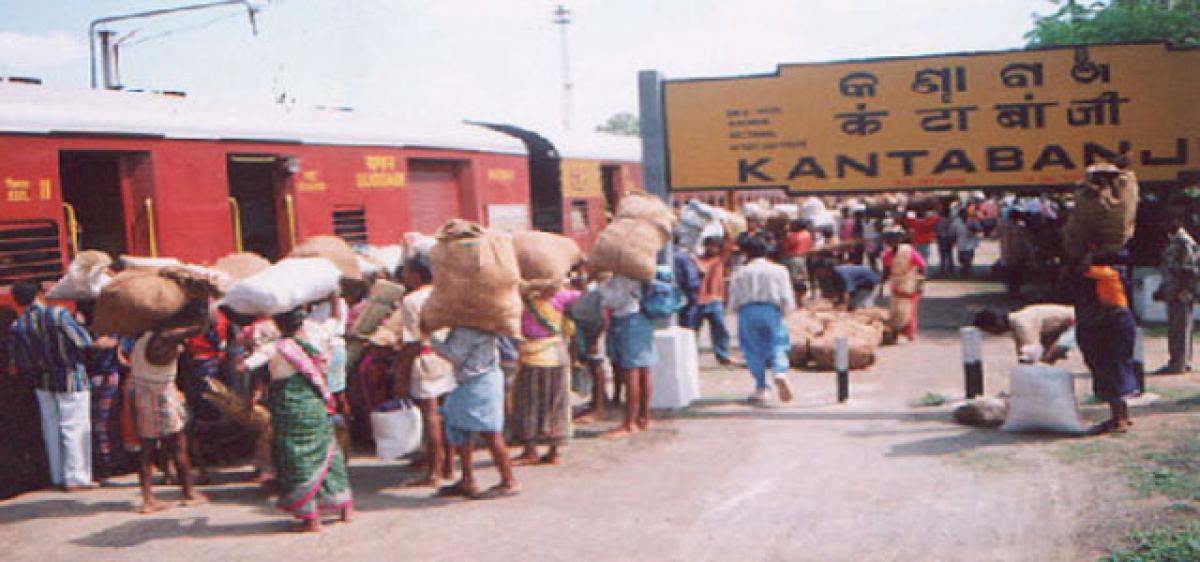Agents sell one-way ticket to debt bondage

Nijam Khan was on a recruiting spree. All through the autumn, he drove to villages around the town of Kantabanji in Odisha looking for labour.
Migration express
Kantabanji (Odisha): Nijam Khan was on a recruiting spree. All through the autumn, he drove to villages around the town of Kantabanji in Odisha looking for labour. He zeroed in on poor families, jobless men and desperate couples. He gave them cash to buy food and clothes ahead of the local harvest festival. In return, they gave him their freedom. “There are no jobs here,” Khan said, sitting in the office of his self-styled transport company in Kantabanji, a railway town in the drought-prone district. “The people will starve if we don't give them these loans and jobs.”
What Khan describes as “loans and jobs”, rights groups call debt bondage - the most prevalent form of forced labour in a country where an estimated 18 million people live in some form of modern slavery, according to the latest Global Slavery Index by Walk Free Foundation. In Kantabanji, population 22,000, it's so prevalent that every second person seems to be a “sardar”, or labour agent.
“The booming economy of Kantabanji is like an oasis in the otherwise desolate, poor landscape of Balangir district,” said Umi Daniel, a migrant rights activist with Aide et Action in Odisha. “The railhead thrives on the labour of migrant workers who are sent with the promise of better wages. But the only people making profits are the labour agents sending them out.”
Agents prey on the tens of thousands of families who leave their villages in western Odisha each autumn to seek work across India in a mass movement of people called the “annual migration”, which lasts until the spring planting season. Most are duped into offering themselves for work as security against a loan they have taken or debt inherited from a relative, rights activists say. They then spend the next six months - or more - working to pay it back.In 90 per cent of cases, they are trafficked by labour agents to brick kilns to feed India's construction industry.
Smuggled past officials
The agents, most in their 30s or early 40s, have found ways to bypass the law, pay off officials and keep up the steady supply of cheap labour. Illegal recruitment is an industry worth $150 billion a year, campaigners say. Alongside the sardars are the so-called muscle men who settle scores with defaulters and bribe officials. These enforcers sneak bonded labourers past authorities by disguising them as marriage parties or splitting families into smaller groups, senior police officer Ashish Kumar Singh told the Thomson Reuters Foundation.
Around 230 agents received licences in 2015 to recruit workers legitimately in Balangir district under legislation on the inter-state movement of labour, government data shows. They registered and sent out 17,998 workers to brick kilns nationwide. This year, 170 agents have been granted licences and more than 13,000 labourers have been registered, all scheduled to leave their homes in November. Those figures are dwarfed by the actual number of migrants who leave the district every year - around 500,000, according to activists and agents in Kantabanji.
“They are going illegally, which means they are being trafficked,” district labour officer Madan Mohan Paik said. “But we don't have ways and means to check this effectively. It has been like this for a very long time.” The exploitation begins with an “advance” of Rs 20,000 - a welcome sum in a region where poverty is dire. The workers have to pay back the loan after six months.
Kilns typically pay Rs 300-400 per 10,000 bricks, which means workers need to make almost 700,000 bricks to pay off the debt. In addition to getting back their advance, agents receive a commission for every worker they send out. They also get Rs 20 for every 1,000 bricks the workers make. Rescued workers say there is often no documentation of loans taken or how much debt has been cleared. “Even before I left my village, I had worked up a debt of nearly Rs 30,000 ,” Umesh Mahanand, 17, said. “But I thought I would work hard and repay it quickly. I didn't realise that the amount can technically never be repaid.”
The new normal
It's all said to have started in the 1970s with a man named Dashrath Suna, known as a champion brick maker. He was one of the first men to migrate from Balangir, one of the poorest districts in western Odisha. “I was very good and could make 6,000 bricks a day,” Suna told the Thomson Reuters Foundation at his home in Belpada village, 50 km) from the Kantabanji. “The brick kiln owner was happy and asked me to bring in friends to work the next time. I did and slowly it became a business.”
Suna would cycle to far-flung villages, offering small loans around the festive time of Nuakhai in September, when farmers celebrate the rice harvest. “Everyone needs a little extra cash around Nuakhai, to buy clothes, cook a good meal, drink a little and celebrate,” he said. So he convinced families to migrate out of the drought-prone region, where reliable employment is rare. “I was able to convince them and the labour market was built on the trust between the brick kiln owner, the agent and the labourer,” the octogenarian said. As the labour market grew, so did Suna's fortunes.
Over the years, he built a two-storey house in Belpada, where he lives with his children and grandchildren. His success spurred others to become labour agents. “Everyone in this village has profited from migration,” said his son, Ruku Sona, a popular singer in the region. “Even the labourers have benefited. Every home will have a motorcycle now. It wouldn't have been possible if labour wasn't sent out. Nobody should really be complaining.”
In the bylanes of Kantabanji, Suna's name is whispered with reverence. But Bablu Khan's is uttered with fear. One of Suna's men in the early days, his job was to pay off labour inspectors and railway police and fight other agents to ensure the workers Suna had picked made it onto the “migration express”. Once he'd learnt the ropes, he started out on his own.
Bablu Khan soon became the biggest player in the market, sending out more labour than any other agent and quickly changing the ground rules of migration in Kantabanji. “The market became brutal,” said one sub-agent, declining to be identified. “People were herded like cattle and sent on trains. Many survive the journey and the hardships at the brick kilns. Many others don't.”
In 2013, the brutality of the business hit global headlines when agents chopped off the hands of two labourers for trying to escape debt bondage. The case is still on at a court in Odisha.
Railhead to misery
Nijam Khan keeps a tidy desk at the Khwaja Garib Nawaz Transport Office, with two biscuit tins in one corner and a picture of his father. He arrived dressed in a crisp white shirt and blue jeans, preceded by two henchmen who told half a dozen labourers sitting on a bench outside to wait in an alley nearby. Inside, Nijam Khan showed off his labour agent licence and the lists he keeps. They show who has been sent where and how much each worker has been paid in advance.
“My father had a licence to send 1,400 labourers and we renew it religiously,” he said. “Everyone is an agent now and everyone is sending a few hundred people out. It's a way of life here.” Police officials, requesting anonymity, said Nijam Khan sends thousands more workers than his licence allows. Khan denies that he exceeds his legal quota. The proceeds from migrant labour account for 50 per cent of the region's economy, said Haji Mohammad Ayub Khan, Kantabanji's elected representative in the state assembly. His own brother was one of the bigger labour agents in town.
“Government schemes are not reaching remote villages, leaving people with practically no options. If migration is stopped, people will turn criminals. They will take to stealing to stay alive.” To make the process more efficient, he has asked the railway ministry to increase the number of trains heading out of Kantabanji.
Politician Khan's brother, labour agent Haroon Khan, keeps a close eye on goings-on at the Kantabanji railway station. He sat on a chair on the pavement outside his office, reluctant to talk about a “dying business” he says he had given up. But in the next hour, over cups of sweet tea, he talked about “the glorious days when business comes to town”. “The hotels would be full and brick kiln owners would hand over large suitcases of money to be distributed as advances,” he recalled as it got dark. “There would be a certain air of festivity.”
By Anuradha Nagaraj








